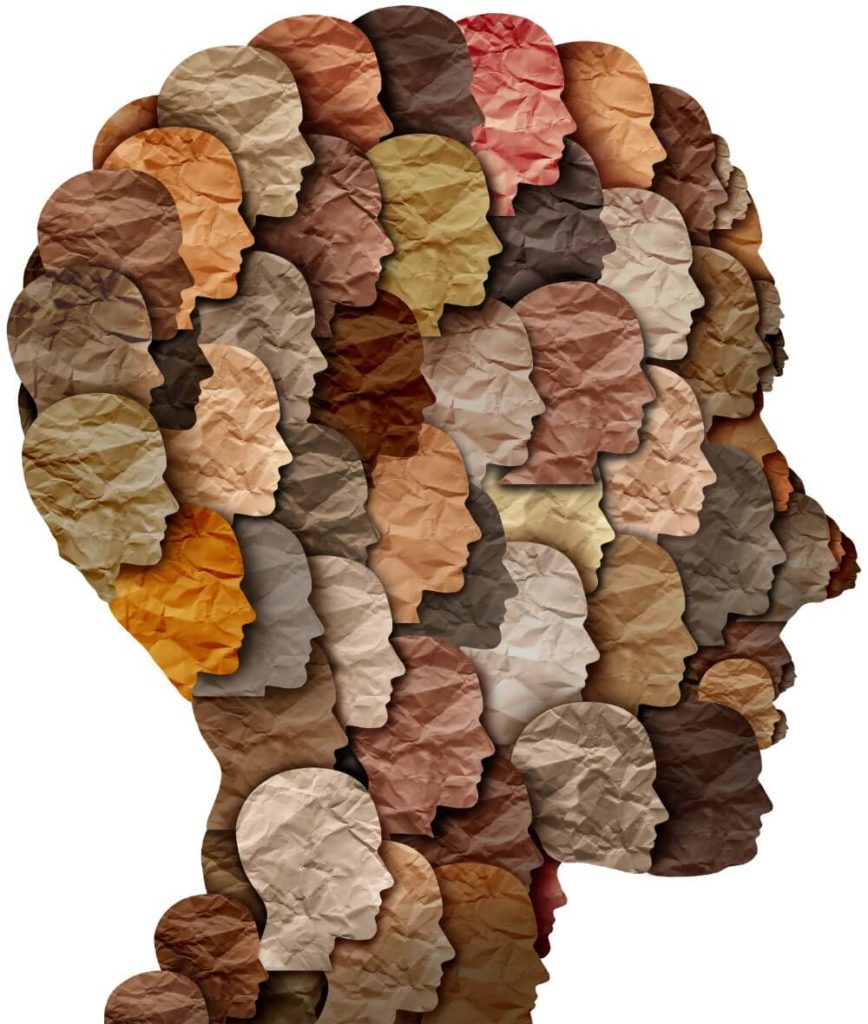
In January 2022, The Council on Library and Information Resources (CLIR) introduced the Curated Futures Project, a collection of collaboratively produced works that respond to the theme “A Third Library is Possible.” The collection was created to serve as a provocation and guide for gallery, library, archive, and museum (GLAM) professionals to navigate beyond discussions of decolonizing memory organizations to begin taking practical steps to enact change. These works not only speculate about aligning collections and research with social impact, but they also provide examples in a variety of mediums including podcasts, visualizations, multimedia, and more. In May 2023, six new works originally created for a 2022 Temple University Libraries symposium on Afrofuturism and the digital humanities were edited and incorporated into Curated Futures, bringing more visions of possible futures for libraries into conversation with the five original works.
(updated May 2023)
The following are abstracts for each contribution
The primary impetus for the Present Counters: Digital Humanities Meet Afrofuturism symposium hosted on April 21-22, 2022 at Temple University Libraries and, by extension, this special issue was to employ Afrofuturism as a conceptual model to develop an inclusive and accessible digital humanities practice centered around the needs of the Black studies community. Composed of seven presentations, a moderated panel discussion, a tour of the Temple University Libraries Loretta C. Duckworth Scholars Studio, project demonstrations, and various performances, Present Encounters: Digital Humanities Meet Afrofuturism brought scholars, students, and practitioners together within the physical space of the Charles Library and the conceptual space of Black digital humanities. Five of the presentations from the symposium are included in this issue as articles.
(May 2023)
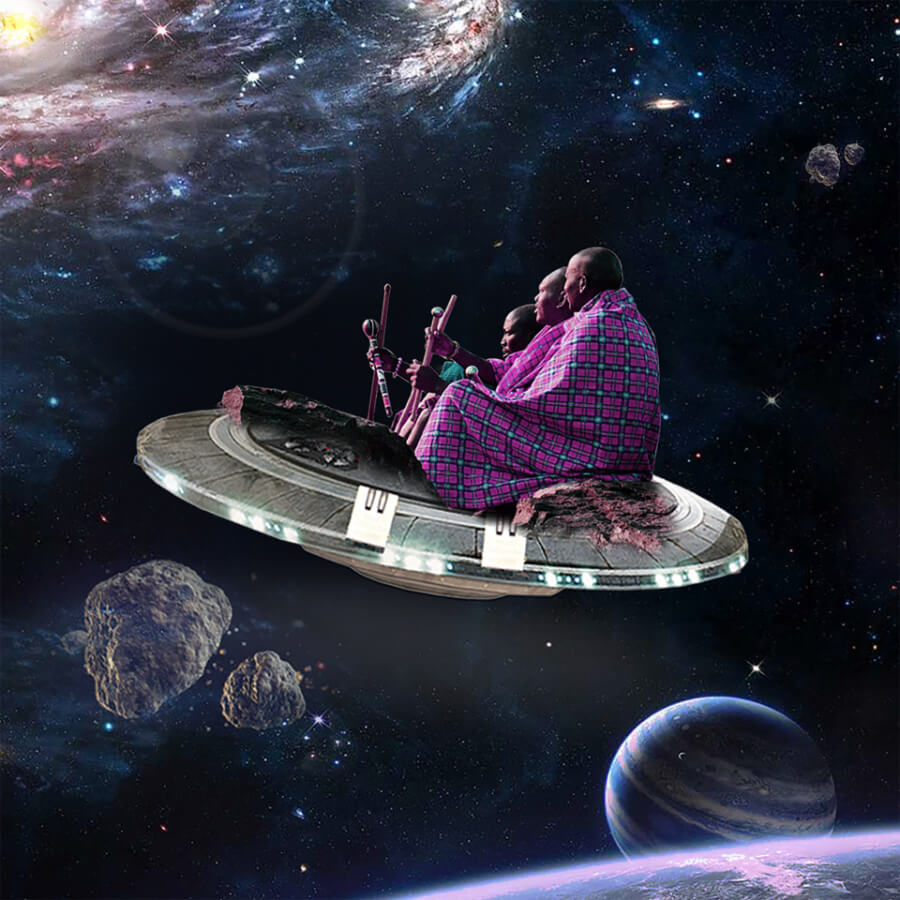
“Three Elders” by Jacque Njeri
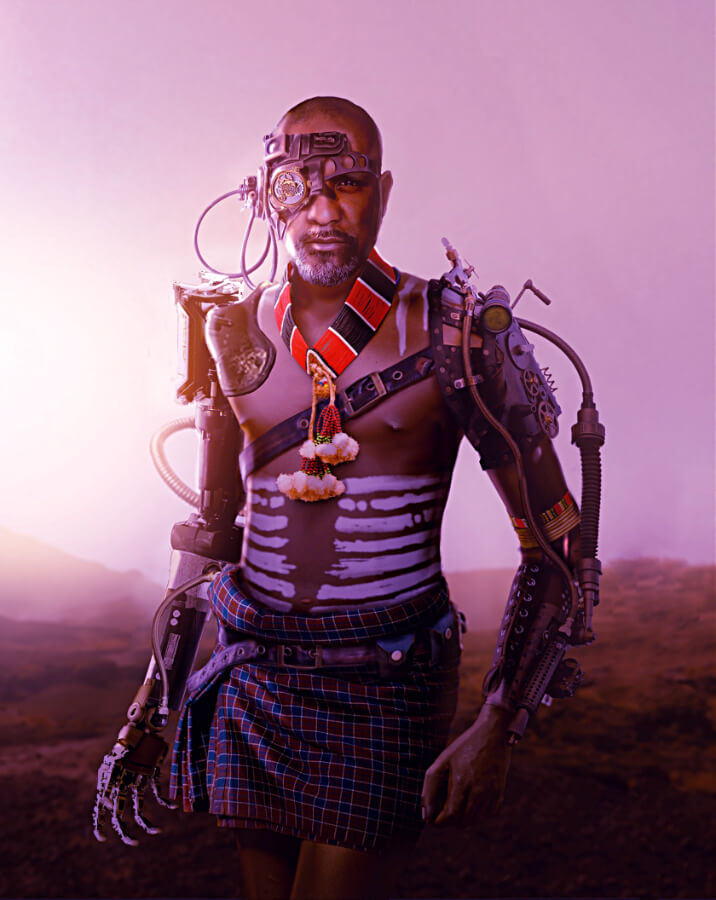
Serengeti Cyborg by Fanuel Leul
Since the end of the 19th century, during the Industrial Revolution scholars like W.E.B. Dubois, concerned about the ability to retrieve accurate information about people of African descent, started the Encyclopedia Africana project to address this issue. The politics of knowledge and information continued into the 20th century. In a US context, toward the end of the Cold War and fall of Apartheid, a new generation of theorists emerged to identify or critique the moment between 1987 and 1993. During this period in question creatives like Mark Dery, Kodwo Eshun, Alondra Nelson, and others articulated an emerging phenomenon they described as Afrofuturism. Early Afrofuturism characterized the intersection between Black people in the US, science fiction, technology, music, and art at the end of the 20th century. Contemporary Afrofuturism is Pan-African, transnational, and is the conscious location of African agency in time and space. Within its scope are metaphysics, aesthetics, social science, theoretical and applied science, and programmatic spaces. However, in the wake of the COVID-19 pandemic and the shift of economic production to digital platforms, climate change, technological acceleration, and the emergence of the metaverse, in the present and near future the challenge then becomes how to theorize and forecast the potential outcomes for people of African descent in the face of these existential threats.
(May 2023)
Through photogrammetry, I have created three-dimensional models of public art by Black artists in Philadelphia organized into an interactive mapping visualization with augmented reality content. Since its inception, Sacred Geographic Superimpositions has expanded into a virtual collage of local public artworks, African sculptures and instruments from the Philadelphia Museum of Art and Temple University Libraries Charles L. Blockson Afro-American Collection, and spiritual and metaphysical items in order to transform each included outdoor sculpture and mural into altars adorned with the latter elements. This project is a spiritual scholarly endeavor to document and celebrate ephemeral Black public art in Philadelphia in a manner that transports them into the ancestral plane of the “transformative archive” to bring scholarly research and data curation out of the academy into a curated space grounded in storytelling and interpretation.
(May 2023)

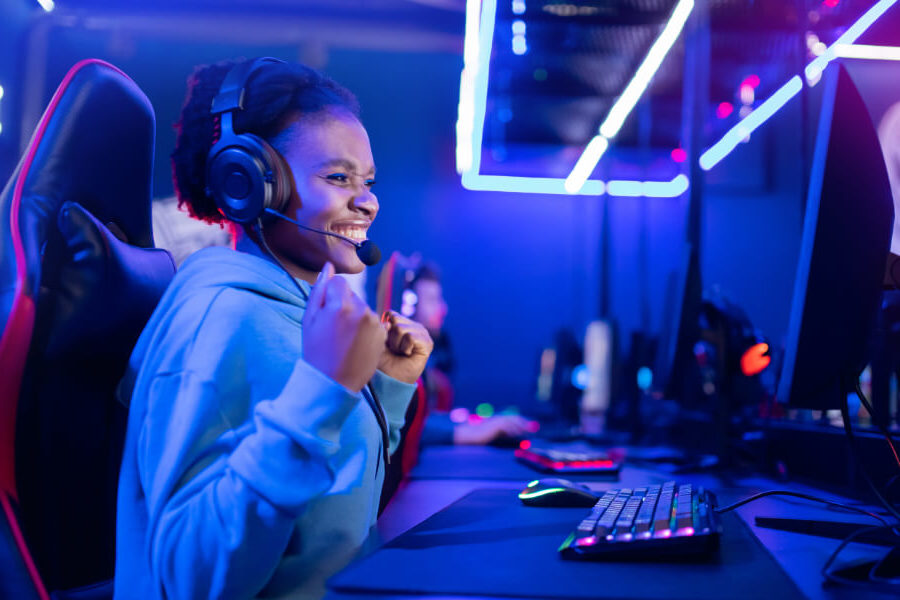
“Black Lives Matter” is not just a phrase or way of thinking as it relates to police brutality and racist violence towards Black life, but it is also necessary in the fantasy and gaming realm. Much like any other art form or popular medium, the world of gaming and fantasy must be open to having a talk about its history of racial and cultural insensitivity, regardless of the pushback. Gaming and the Black imaginary is an arena that covers a lot of territory which engages with digital storytelling, self and community discovery, and interactive narratives. As complex systems of visual culture, gaming has a history of oscillating between problematic imagery and representation to liberating characters and intersectional organizations. Moreover, in this piece, I discuss the relationships between Blackness and technology and resistance and action in gaming, along with the emergence of a variety of Black gamer communities.
(May 2023)
The Virtual Blockson is a project to build a virtual reality game that will teach high school students primary source literacy using a virtual recreation of the Charles L. Blockson Afro-American Collection (Blockson Collection), comprising over 700,000 items related to the African Diaspora. The game will be created in tandem with accompanying teaching materials to allow students to meet the learning objectives laid out in the “Guidelines for Primary Source Literacy” developed by a joint task force on behalf of the Association of College and Research Libraries Rare Books and Manuscripts Section and the Society of American Archivists. A prototype of the game, focusing on Black art and the Pyramid Club, is currently being built by the Temple University Libraries Loretta C. Duckworth Scholars Studio and Blockson Collection with a focus on accessibility for disability and community education.
(May 2023)
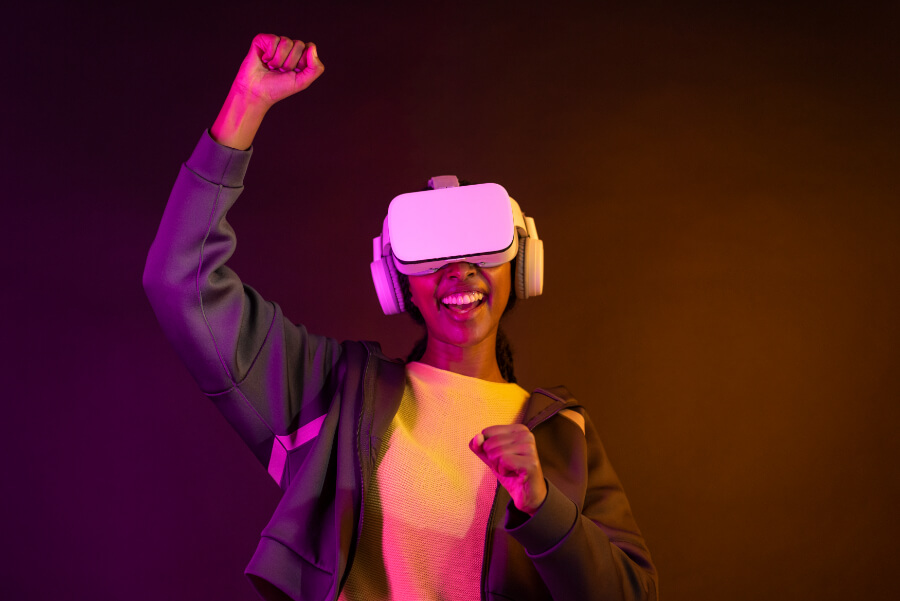

In this essay I invite us all to work through lessons from Black speculative futures that make room for capacious forms of living and listening with each other. These futures offer paths for redesigning the structure and substance of educational work in present digital spaces. While I speak about digital tools and technologies that have helped advance humanistic inquiry for a generation of academic work, this essay isn’t about these tools; it isn’t even about the scholarly projects that they support. It’s about the choices we make, across the various communities we serve, that help sow seeds for new encounters within a living world that we hope to grow together—a world in which joy is one of the juiciest fruits of justice and for which freedom is a fundamental act. These choices challenge us to create otherwise, through collaborative community agreements, adapted from “Earthseed” verses from Octavia Butler—in Black quantum future time (Phillips, 2020); through speculative toolkits designed around mundane manifestos for social justice (Syms, 2013); and through transformative strategies built on questions like: “If not now, then when?” As we encounter realities where Digital Humanities and Afrofuturism meet, it’s important to consider what “each of us” can do, once we’ve convinced ourselves that a living world is worth changing for—no matter how impossible that change may seem.
(May 2023)
An academic library cannot meaningfully serve its campus without also serving the range of communities within which faculty, staff, and students are embedded. Just as lines on maps are cartographic simplifications of reality, the distinctions we make between the university and surrounding communities are arbitrary and constructed. Though not unproblematic, the tools of GIS and digital scholarship more broadly make it possible for library workers to contribute directly to projects that transcend this campus-community border. We call upon academic librarians to use the tools at their disposal to more meaningfully engage with community-engaged and justice-minded projects. Deliberately disrupting the firm distinction between campus and community is one step in a longer process that is not clearly mapped, and we wish to provide a variety of starting points to consider.
(January 2022)
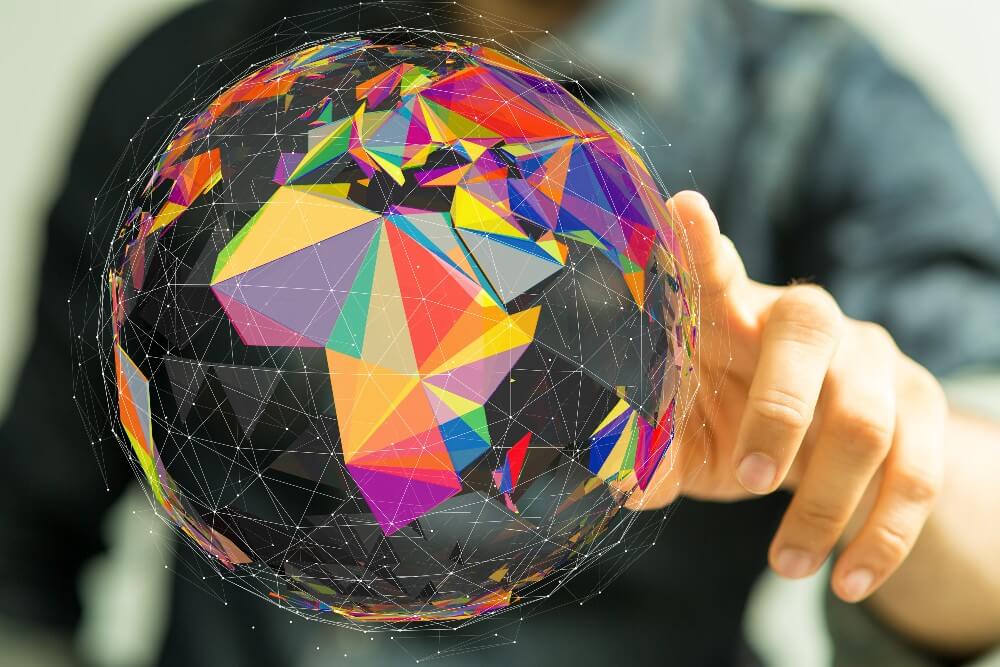
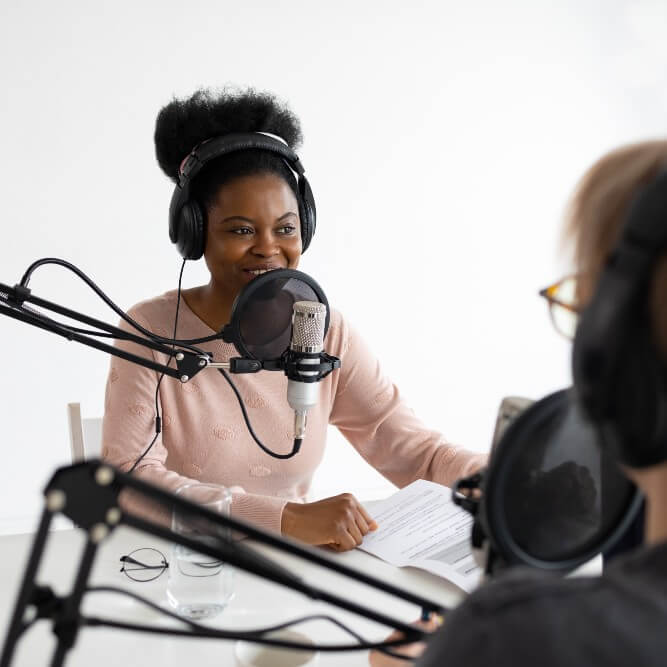
Our podcast series holds the microphone up to archivists, scholars, and museum staff who work with collections pertaining to BIPOC (Black, Indigenous, and people of color) communities. Thus far, two paths have emerged: (1) reinterpreting archival, library, and museum content that comes from predominantly White colonial perspectives; and (2) introducing underrepresented BIPOC narratives into the mainstream. Such efforts have already been evolving in local BIPOC libraries, archives, and museums in neighborhoods and in tribal communities. In speaking with BIPOC scholars, archivists, and librarians and non-BIPOC allies, many have recommended establishing contact with the communities to whom the collections belong, making sure that they have gained full agency over the life cycle and uses of the materials that pertain to BIPOC cultures and points of view. We aim to understand how their archival practices provide more agency for BIPOC communities, differing from those practiced by the “first” university systems. In short, our work sits at the juncture of both a redefinition (especially for predominantly White institutions) and a continually strengthened construction of archives (for BIPOC communities).
(December 2021 – February 2023)
Imagining the future of libraries and especially of digital exhibits cannot be completed without exploring the role games can play in the future of collection curation. Besides their popularity, games facilitate and inform our understanding through interactive engagement and have been shown to serve as alternative modes for designing learning experiences and environments. We adopt such a perspective as we look into the ways gaming can inform the design of digital exhibits and help make digital collections more accessible and inclusive to a wider audience.
(January 2022)


This visualization and accompanying short essay articulate both a broad definition of what constitutes scholarship as social change (any knowledge production that has a goal of exploring, articulating, and intervening in inequities and injustices, past and present) as well as projects that helped inspire the contributions of to the Curated Futures Project (Gamifying Digital Collections, Remaking Space and Place, FLAME, and The Third Library and the Commons). It also invites readers to submit their own examples of projects that they think embody “scholarship as social change.”
(January 2022)
The idea of the “commons” is often invoked in discussions of the academic library’s future, but these references are usually vague and rhetorical. What exactly does it mean for the library to be organized as a commons, and what might such a library look like? Does the concept of the commons offer a useful lens for identifying the library’s injustices or shortcomings? How might we draw on the concept of the commons to see beyond the horizon of the contemporary library, toward a “Third Library” that truly advances decolonial and democratic ends?
This essay engages with such questions and explores how the constituent elements of the academic library—its knowledge assets, its workers, and its physical spaces—might be reoriented toward the commons. It argues that such an orientation might facilitate the emergence of a Third Library that is able to organize resistance to contemporary capitalism’s impetus toward the privatization and enclosure of knowledge, and to help recover a democratic conception of knowledge as a public good.
(January 2022)
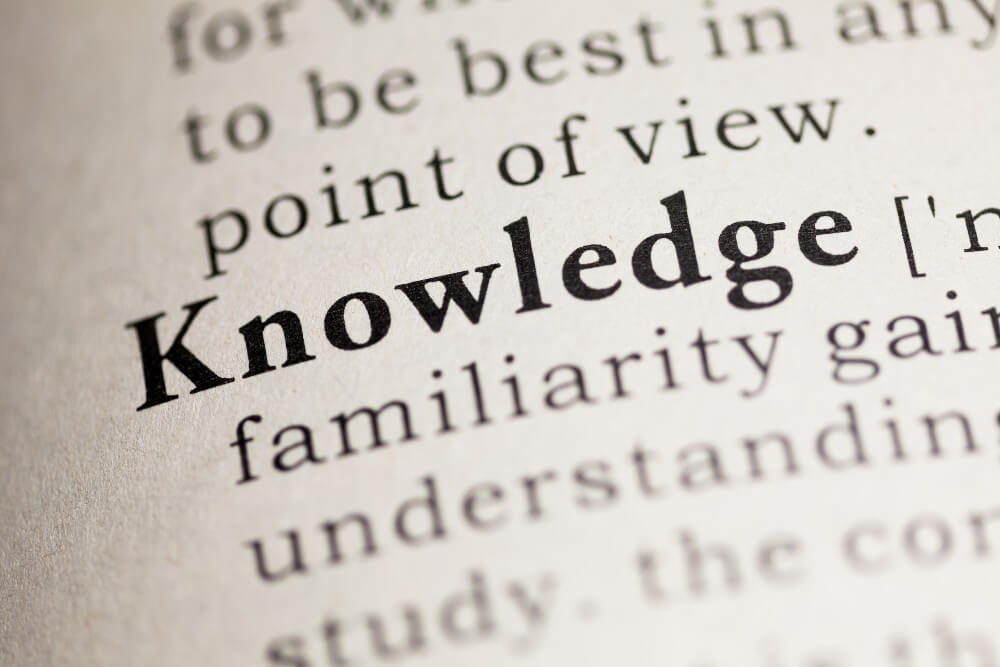
This publication has been created through the Council on Library and Information Resources (CLIR) Postdoctoral Fellowship Program with support from The Andrew W. Mellon Foundation.
Get the latest updates from the CLIR Curated Futures Project delivered to your email inbox.